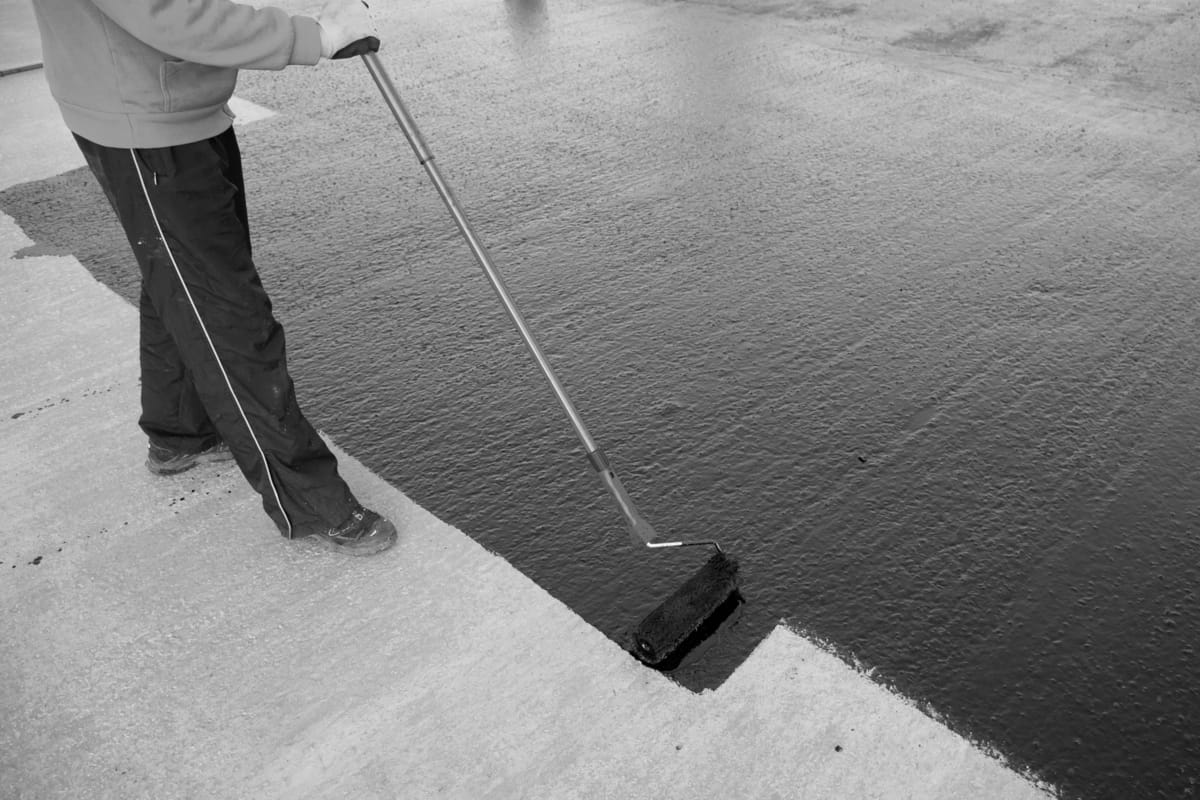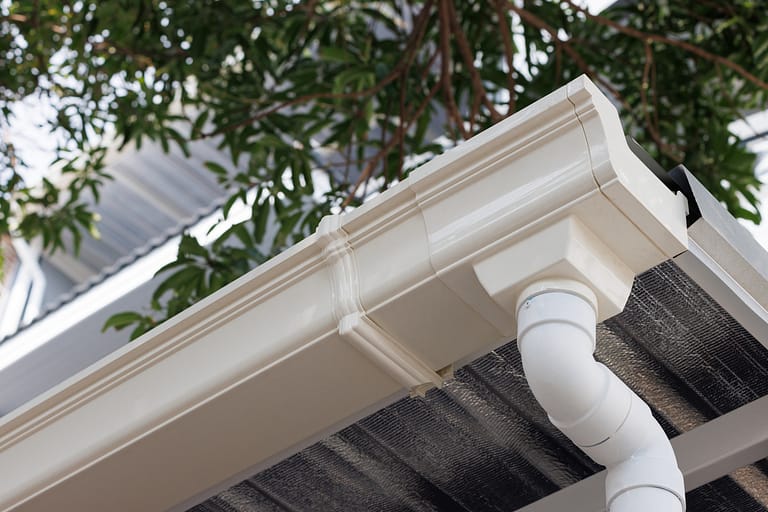When it comes to protecting your commercial property, the roof stands as your first line of defense against the elements. Ensuring its longevity and durability is crucial for maintaining the structural integrity of your building. One effective method that has gained traction in recent years is the application of roof coatings.
In this blog, we’ll delve into:
- What roof coatings are
- How they benefit your commercial roof
- The various types available
- Associated costs
- Longevity
- Considerations for roof replacement
- How to find a qualified contractor for the job
Understanding Roof Coatings
Roof coatings are seamless, protective layers applied to the surface of your existing roof. They serve as a shield, safeguarding your roof from weathering, UV radiation, moisture, and other environmental factors that can lead to deterioration over time.
These coatings are typically formulated from various materials, including silicone, acrylic, polyurethane, and bitumen, each offering unique properties suited to different roofing substrates and climates.
Benefits of Roof Coatings
Investing in a roof coating offers a multitude of benefits for your commercial property:
- Enhanced Durability: Roof coatings provide an additional layer of protection, extending the lifespan of your roof by shielding it from damage caused by UV rays, temperature fluctuations, and inclement weather.
- Improved Energy Efficiency: Certain roof coatings are designed to reflect sunlight, reducing heat absorption and lowering indoor temperatures. This can result in decreased cooling costs during hot summer months.
- Seamless Waterproofing: By forming a seamless membrane over your roof, coatings prevent water infiltration, reducing the risk of leaks and water damage to your building’s interior.
- Cost-Effectiveness: Compared to roof replacement, applying a coating is a more budget-friendly option. It requires less labor and materials while still providing effective protection and prolonging the life of your roof.
- Environmental Sustainability: Many roof coatings are formulated to be environmentally friendly, contributing to sustainability efforts by reducing energy consumption and the need for roof replacements, which generate waste.
4 Types of Commercial Roof Coatings
There are several types of roof coatings available, each with its own set of characteristics and applications:
1) Acrylic Roof Coatings:
Known for their versatility and affordability, acrylic coatings are water-based and provide excellent UV resistance. They are suitable for various roofing materials, including metal, single-ply membranes, and built-up roofs.
2) Silicone Roof Coatings:
Silicone coatings offer superior waterproofing properties and are highly resistant to UV radiation and weathering. They remain flexible over time, adapting to temperature fluctuations without cracking or peeling. Silicone coatings are ideal for flat and low-slope roofs.
3) Polyurethane Roof Coatings:
Polyurethane coatings provide exceptional durability and impact resistance. They form a seamless, elastic membrane that can withstand foot traffic and harsh weather conditions. Polyurethane coatings are commonly used for foam roofs and areas prone to heavy traffic.
4) Bitumen Roof Coatings:
Bitumen-based coatings, also known as asphalt coatings, offer excellent waterproofing and adhesion properties. They are ideal for built-up roofs and provide protection against water penetration and UV damage.
Choosing the right type of coating depends on factors such as your roof’s substrate, climate, and specific performance requirements.
Cost Considerations
The cost of applying a roof coating can vary depending on several factors, including the type of coating, the size and complexity of your roof, and any necessary preparation or repairs. On average, the cost ranges from $1.50 to $5.00 per square foot. While this initial investment may seem significant, it pales in comparison to the expense of roof replacement, making it a cost-effective solution for extending the life of your roof.
Longevity of Roof Coatings
The longevity of a roof coating depends on various factors, such as the type of coating used, the quality of the application, and environmental conditions. In general, most roof coatings have a lifespan of 10 to 20 years. Regular maintenance, including periodic inspections and recoating as needed, can help maximize the longevity of your roof coating and ensure continued protection for your commercial property.
When to Opt for Roof Replacement
While roof coatings offer a viable solution for extending the life of your roof, there are instances where roof replacement may be necessary:
- Severe Damage: If your roof has extensive damage or structural issues that cannot be addressed with a coating, replacement may be the best course of action.
- End of Lifespan: If your roof has reached the end of its expected lifespan and is experiencing frequent leaks or deterioration, replacement may be more cost-effective in the long run.
- Change in Building Use: If you are renovating or repurposing your commercial building and require a different type of roofing system, replacement may be necessary to meet new requirements.
It’s essential to consult with a qualified roofing contractor to assess the condition of your roof and determine the most appropriate course of action.
Finding a Qualified Commercial Contractor
Choosing the right contractor is paramount to the success of your roof coating project. Here are some tips for finding a qualified commercial roofing contractor:
Research and Credentials:
Look for contractors with experience and expertise in commercial roofing and roof coating applications. Check their credentials, certifications, and customer reviews to ensure reliability and quality workmanship.
Ask for References:
Request references from past clients and inquire about their experience working with the contractor. A reputable contractor should be able to provide references and examples of previous projects.
Get Multiple Quotes:
Obtain quotes from multiple contractors to compare pricing, services, and warranties. Beware of significantly low bids, as they may indicate subpar materials or workmanship.
Review Contracts and Warranties:
Review contracts carefully and ensure they include detailed specifications, timelines, and warranty information. A reputable contractor should offer a warranty on both materials and workmanship to provide peace of mind.
Communication and Transparency:
Choose a contractor who communicates openly and transparently throughout the project. They should be responsive to your questions and concerns and keep you informed of progress every step of the way.
By following these guidelines and conducting thorough research, you can find a qualified commercial contractor who will deliver quality results and protect your investment for years to come.
Learn More About If A Roof Coating Is Right For You
Roof coatings offer a cost-effective and sustainable solution for extending the life of your commercial roof while enhancing its performance and energy efficiency. By understanding the benefits, types, costs, and considerations associated with roof coatings, you can make an informed decision to safeguard your property and maximize its potential. Remember to consult with a qualified roofing contractor to assess your roof’s condition and determine the best course of action for your specific needs.
With proper maintenance and care, a quality roof coating can provide reliable protection and peace of mind for years to come. Reach out to G Cannon Roofing today to learn about our roof coating services!









